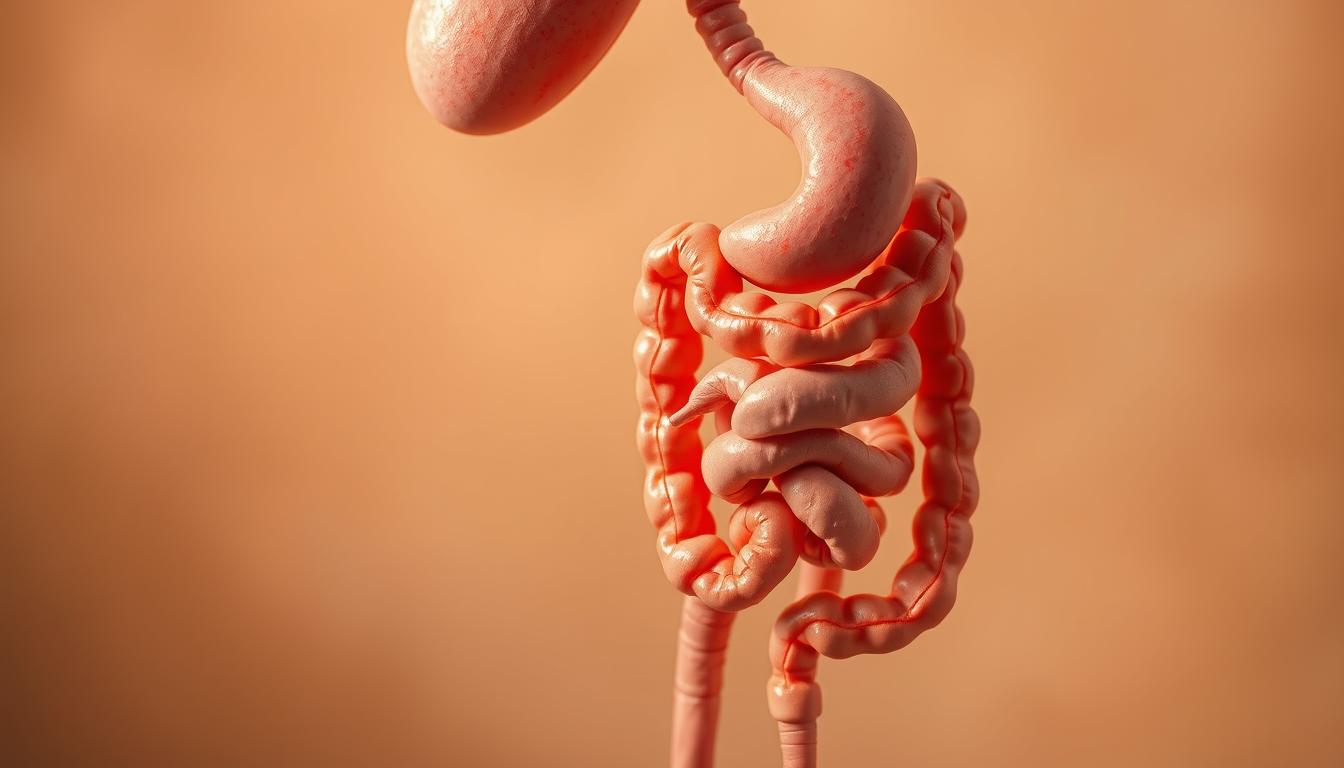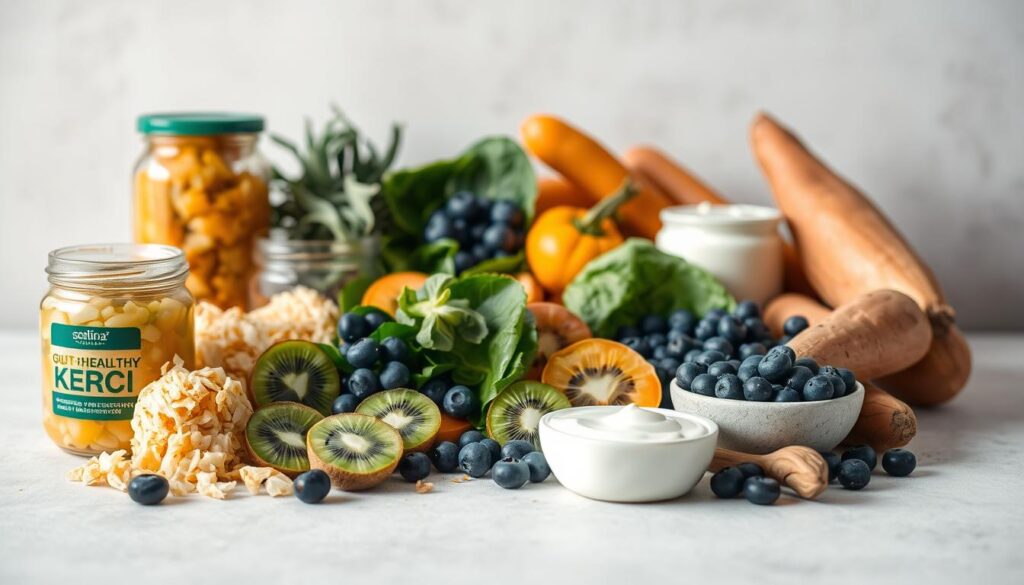Boost Your Gut and Digestive Health Naturally
Keeping your digestive system healthy is very important. Dr. Rachel Schiesser, a gastroenterologist, says, “Gut health…

Keeping your digestive system healthy is very important. Dr. Rachel Schiesser, a gastroenterologist, says, “Gut health means taking care of your digestive system. It helps you stay healthy and avoid diseases.”
By looking after your gut microbiome, you help your body digest food, work well, and fight off sickness. A balanced gut microbiome makes you feel your best. You can improve your health by choosing the right foods and living habits.
Key Takeaways
- Maintaining a healthy gut microbiome is key for your health.
- Eating right helps your digestive system work well.
- What you do every day affects your gut health a lot.
- Good gut health boosts your immune system.
- A healthy digestive system helps your body use energy better.
Understanding the Gut and Digestive System
Knowing about your gut is important for better digestion. Your gut and digestive system are complex. They play a big role in your health.
The Role of the Gut Microbiome
The gut microbiome is a group of tiny living things in your gut. It helps keep your gut lining healthy and controls your immune system. Having a balanced gut microbiome is key for good digestion and health.
The gut microbiota helps break down food. Your body then uses this to make important chemicals. Eating gut-friendly foods helps this process.
How Digestion Works
Digestion is how your body breaks down food into nutrients. It starts in your mouth and goes through your stomach and intestines. A healthy digestive system is important for absorbing nutrients and making energy.
Things like diet, stress, and lifestyle can affect digestion. Eating foods high in fiber and using gut health supplements can help your digestion.
Importance of Gut Health
Gut health is connected to your overall health and happiness. A healthy gut means a strong immune system, mental clarity, and a healthy weight. Keeping your gut microbiome balanced is important.
Eating gut-friendly foods and living a balanced life can help your gut. This improves your overall health.
Common Digestive Disorders
Keeping your gut healthy is very important. More people are getting digestive problems. Knowing about common issues can help you feel better.
Symptoms of Digestive Issues
Digestive problems show up in many ways. You might feel:
- Bloating and gas
- Abdominal pain or cramps
- Diarrhea or constipation
- Fatigue
These signs can really hurt your life. It’s key to find out why you’re feeling this way.
Causes of Gut Problems
There are many reasons for gut troubles. Some include:
- Eating too much processed food and not enough fiber
- Stress and not sleeping well
- Medicines like antibiotics that mess with your gut
Probiotics for digestion can help fix your gut. They help keep the good bacteria in your gut healthy.
When to Seek Medical Advice
If your digestive problems don’t go away or are very bad, see a doctor. They can figure out what’s wrong and suggest treatments. This might include probiotics to help your gut.
Learning about digestive issues can help you stay healthy. You can change your diet, handle stress better, and use probiotics for digestion to keep your gut in good shape.
Foods That Promote Gut Health
Eating foods that are good for your gut is key. It helps your digestion and health. Adding the right foods to your diet can make your gut and body feel better.

Probiotic-Rich Foods
Probiotics are good bacteria and yeasts for your gut. They help keep your gut healthy. Foods like yogurt, kefir, sauerkraut, and kimchi are full of probiotics.
Adding probiotics to your meals is easy. Try yogurt for breakfast or sauerkraut in your salad. These small steps can greatly improve your digestion.
Prebiotics Explained
Prebiotics feed the good bacteria in your gut. They are found in foods like asparagus, bananas, and whole wheat bread. Eating these foods helps your gut stay healthy.
Mixing prebiotics with probiotics is even better. This mix is called synbiotics. It boosts the health of your gut.
Fiber and Its Benefits
Fiber is important for a healthy gut. It helps you go to the bathroom regularly. Foods like fruits, veggies, and whole grains are high in fiber.
Eating a variety of fiber-rich foods is good for your gut. It also helps your overall health and well-being.
By eating a diet rich in probiotics, prebiotics, and fiber, you can improve your gut health. Also, trying natural remedies for digestion can help. They can make your digestive system balanced and healthy.
The Power of Hydration
Water is a hero for your gut health. It helps your digestive system work well. Drinking enough water is key for a balanced gut microbiome.
How Water Affects Digestion
Water helps break down food in your stomach. It also stops constipation by moving your digestive tract. Without enough water, you might feel uncomfortable and it could harm your gut.
“Drinking water is essential for digestive health, as it helps dissolve nutrients and soluble fiber, making them more accessible to your body.”
Signs of Dehydration
Dehydration shows in many ways, like dry mouth and feeling tired. It can also cause constipation by taking water from your colon. Spotting these signs early helps fix the problem.
- Dry mouth and throat
- Dark yellow or brown urine
- Fatigue or lethargy
- Constipation or hard stools
Tips for Staying Hydrated
Drinking water is easy. Start with a glass of water when you wake up. Keep drinking water all day. Eat hydrating foods like watermelon and cucumbers too. Also, think about gut health supplements that help with hydration.
“The key to staying hydrated is consistency. Make drinking water a habit by incorporating it into your daily routine.”

If you find it hard to drink enough water, try a few things. Add fruits or herbs to your water. Or, set reminders to drink water at certain times.
Lifestyle Changes for Better Digestion
Your digestive system is closely tied to your lifestyle. This includes exercise, stress, and sleep. Making smart choices in these areas can boost your gut health and overall health.
Benefits of Regular Exercise
Exercise is good for your heart and muscles. It also helps your digestive system. It makes your gut muscles work better and prevents constipation.
Exercise also helps grow good bacteria in your gut. This is key for a healthy gut microbiome.
Start moving more every day. You can walk, jog, cycle, or do yoga. Pick what you like and do it often.

Stress Management Techniques
Stress hurts your digestive health. It can cause IBS, acid reflux, and stomach ulcers. So, it’s important to manage stress.
Try meditation, deep breathing, and mindfulness to lower stress. Doing things you love can also help.
Sleep and Gut Health
Good sleep is vital for your gut. Bad sleep can upset your gut’s balance, causing problems. Aim for 7-9 hours of sleep each night to support your gut.
Have a bedtime routine, avoid caffeine and screens before bed, and make your sleep area comfy. These steps can help you sleep better.
By exercising regularly, managing stress, and sleeping well, you can improve your digestion. Adding gut-friendly foods and probiotics to your diet can also help. These changes can lead to better gut health.
Natural Supplements for Gut Health
Natural supplements are key for a healthy gut and digestive system. Adding the right supplements to your day can help your gut health. It might also ease digestive problems.
Many natural supplements are good for gut health. These include probiotics, digestive enzymes, and herbal remedies. Let’s explore each one and their benefits.
Probiotics and Their Benefits
Probiotics are good bacteria and yeasts for your gut. They help keep your gut bacteria balanced. This is vital for digestion and a strong immune system.
Probiotics can help with diarrhea, constipation, and ulcerative colitis. They make digestion better.

Digestive Enzymes
Digestive enzymes break down food into smaller bits. This makes it easier for your body to get nutrients. Taking digestive enzymes can help your digestive system.
It might ease indigestion and bloating symptoms.
Herbal Remedies to Consider
Certain herbal remedies have helped gut health for ages. Peppermint oil, ginger, and turmeric are examples. These herbs can calm your digestive tract and reduce inflammation.
They help keep your gut healthy.
When picking natural supplements, talk to a healthcare expert. They can guide you based on your needs. Combining supplements with a good diet and lifestyle supports your digestive system support and health.
The Impact of Sugar on Gut Health
Sugar’s effect on your gut health is very important for your overall well-being. Eating too much sugar can change your gut’s balance. This can lead to digestive problems and affect your health.
How Sugar Affects Gut Flora
Sugar feeds bad bacteria and yeast in your gut. This can cause bloating, gas, and discomfort. Using natural remedies for digestion like probiotics and prebiotics can help.
High sugar intake also causes inflammation in your gut. This can make it hard for your gut to absorb nutrients. This makes your digestive health worse.
Alternatives to Refined Sugar
It’s important to cut down on refined sugar for a healthy gut. There are good alternatives for sweet treats. Honey, maple syrup, and stevia are sweet without the harm of refined sugar.
- Honey: Contains antioxidants and has antimicrobial properties
- Maple syrup: Rich in minerals like manganese and zinc
- Stevia: Zero-calorie sweetener that doesn’t raise blood sugar levels
Choosing these alternatives can help you enjoy sweet tastes without harming your gut. This can greatly improve your gut health and overall well-being.
Strategies to Reduce Sugar Intake
Lowering sugar intake needs awareness, planning, and discipline. Start by reading food labels to find hidden sugars. Slowly add less sugar to your foods and drinks.
Joining digestive wellness programs can also help. These programs teach about whole foods, meal planning, and stress management. They support a healthier gut.
To make lasting changes, try these:
- Plan meals around whole foods like veggies, fruits, and lean proteins
- Avoid sugary drinks and desserts
- Find healthy stress relief like exercise or meditation
By using these strategies, you can cut down sugar and improve your gut health.
The Importance of Mindful Eating
Eating mindfully can make digestion better, reduce stress, and help your balanced gut microbiome. It means eating slowly, enjoying your food, and listening to your body’s hunger and fullness.
Practices for Mindful Eating
To eat mindfully, turn off the TV and put away your phone. Here are some tips to start:
- Take small bites and chew slowly, focusing on the flavors and textures.
- Notice the colors and how your food looks.
- Use all of your senses to enjoy your meal.
- Pause between bites to check if you’re hungry or full.
These practices can make your meals better and help your digestion.
How Eating Habits Affect Digestion
Your eating habits affect digestion a lot. Eating fast can cause bloating and discomfort. But eating slowly and mindfully can help digestion and reduce stress.
A health expert said,
“The way we eat is just as important as what we eat. Mindful eating can help prevent overeating and reduce symptoms of digestive disorders.”
Listening to Your Body’s Signals
It’s important to listen to your body’s signals for a healthy gut. Notice how different foods make you feel. This can help you avoid foods that upset your stomach.
Signs you might need to change your diet include bloating, pain, or changes in bowel movements. Being mindful of these signs can help improve your gut health.
Healing Your Gut Naturally
Healing your gut naturally means making big changes. You need to eat better, live healthier, and focus on gut-friendly foods. These steps help your gut microbiome and make you feel better.
Detoxing for Gut Health
Detoxing is key for a healthy gut. It means getting rid of bad stuff from your diet and surroundings. This helps keep your gut in balance. Here’s how to detox your gut:
- Avoid processed foods and sugary drinks
- Eat more fiber from fruits, veggies, and whole grains
- Drink lots of water to get rid of toxins
- Try probiotics for digestion from supplements or foods
Foods to Avoid for Optimal Digestion
Some foods are bad for your gut. They cause inflammation and mess up your gut’s balance. To digest better, stay away from:
- Processed and packaged foods
- Foods with lots of sugar and refined carbs
- Things with artificial additives and preservatives
Incorporating Fermented Foods
Fermented foods are full of good bacteria. They’re great for your gut. Foods like yogurt, sauerkraut, and kefir are tasty and good for you. They give you probiotics for digestion and help you digest food better.
By choosing the right foods and living a healthy lifestyle, you can heal your gut. This makes you feel better and digest food better.
A Holistic Approach to Overall Wellness
Keeping your gut healthy is key for feeling good. A healthy digestive system helps your whole body. By focusing on healthy gut bacteria and digestive health, you can feel better.
Nurturing Gut Health
To keep your gut healthy, eat well, exercise, and manage stress. Eating fermented foods, prebiotics, and probiotics helps a lot.
Collaboration with Healthcare Providers
Working with doctors helps you make a plan for your gut. They guide you to the best ways to support your digestive system.
Sustainable Gut Health Plan
Creating a lasting gut health plan means changing your habits for good. By staying healthy and caring for your gut, you can stay well.
FAQ
What is the gut microbiome and why is it important for overall health?
The gut microbiome is the trillions of tiny living things in your stomach. They help with digestion, making nutrients, and keeping you healthy. It’s key for your overall health and happiness.
How can I promote a healthy gut microbiome through diet?
Eat foods rich in probiotics like yogurt and kefir. Also, choose prebiotics like asparagus and bananas. And don’t forget high-fiber foods like whole grains and veggies. These foods help your gut stay healthy.
What are some common digestive disorders and their symptoms?
Digestive problems include IBS, IBD, and GERD. Symptoms are bloating, stomach pain, diarrhea, and constipation. If you have these often, see a doctor.
How does hydration impact gut health?
Drinking enough water is vital for your gut. It helps break down nutrients and fiber. Not drinking enough can cause constipation. So, drink plenty of water to keep your gut healthy.
Can lifestyle changes really improve digestion?
Yes, changing your lifestyle can help your digestion. Exercise, managing stress, and sleeping well are all good. They can make your digestion better.
Are there any natural supplements that can support gut health?
Yes, there are natural supplements like probiotics and digestive enzymes. They help keep your gut healthy. Some herbs like peppermint oil and ginger can also soothe your stomach.
How does sugar intake affect gut health?
Too much sugar can upset your gut’s balance. It lets bad bacteria and yeast grow. Eating less sugar and using natural sweeteners helps your gut.
What is mindful eating, and how can it improve digestion?
Mindful eating means eating slowly and paying attention to your body. It reduces stress and helps your body digest food better.
How can I heal my gut naturally?
To heal your gut naturally, eat gut-friendly foods and probiotics. Avoid bad foods and manage stress. Detoxing and eating fermented foods also help.
Why is a holistic approach important for overall wellness?
A holistic approach looks at your gut and overall health together. By taking care of your gut, you can improve your overall health and avoid diseases.
